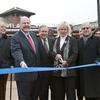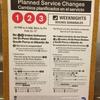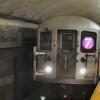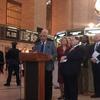Janet Babin appears in the following:
Payroll Tax Agreement Leaves Transit Tax Behind
Friday, February 17, 2012
Commuters had high hopes that Congress would restore the full federal transit tax benefit, cut late last year, as part of the massive payroll tax cut and unemployment benefits bill passed today. But it didn’t happen Friday.
Snapshot | Cortlandt Station Unveiled
Wednesday, February 15, 2012
After a two year, $35 million renovation, MTA Chief Joe Lhota and other transit officials opened the new Cortlandt Station on Wednesday. MTA Metro-North's Cortlandt stop, along the Hudson Line, is about 40 miles north of New York’s Grand Central Terminal and serves some 1,200 passengers daily.
NY MTA Chief Apologizes for Rat Comments
Tuesday, February 14, 2012
(photo by: laverrue)
NY MTA Chief Joe Lhota is apologizing for comments he made about Harlem lawmaker Bill Perkins. But Lhota remains against a bill from Senator Perkins, that would ban eating in the subway.
The proposed law would fine people who eat in the subway up to 250-dollars. Lhota said in the New York Times that as a legislator, “Perkins does nothing but talk and talk and talk, and he does nothing.”
In a statement, the M-T-A chief apologized to Perkins and called him an excellent legislator. Lhota also said he shares Perkins commitment to addressing the problem of rats on the subway.
But in the article, Lhota also linked the rat problem to minority children. Lhota said Perkins bill “severely hurts and impacts minority communities. I don’t want to deny the kid the only time that day he’s going to get food,” Lhota said in the New York Times.
Senator Perkins called Lhota’s remarks “odd and offensive.” “I hope his apology extends to recognizing that this is not a race issue, but a quality of life issue,” said Perkins. Still, the Senator said he respects Lhota for apologizing and looks forward to working with him.
In a story last week, Transportation Nation reported that rats in the subway are far less dangerous than once thought.
New York Senate Votes to Restore a Tax Break for Transit Riders
Tuesday, February 14, 2012
(photo by: harry_nl)
The State Senate has voted to restore a monthly $240-dollar pre-tax credit for mass transit users -- at least for the state portion of commuters' tax bills.
The state benefit was tied to a similar federal one that was cut last year after federal lawmakers failed to extend it before an end of year deadline. That benefit allowed commuters to deduct up to $230 dollars each month from their federal taxes to offset mass transit or parking costs. But because Congress didn’t act on the federal tax break, the state one got cut too.
The Senate legislation would restore the benefit on the state level. It would also uncouple the tax credit from the federal legislation. If the bill passes in the State Assembly, the commuter credit would be restored to 2011 levels and adjusted annually for cost of living increases, regardless of whether Congress authorizes additional extensions at the federal level.
Senator Charles Fuschillo, Chairman of the Senate’s Transportation Committee, sponsored the bill. “With Washington’s lack of action, New York State should do what it can to restore these state tax savings and put money back in the pockets of hard-working commuters. I’m pleased the Senate has passed this legislation and I urge the Assembly to do the same,” said Senator Fuschillo.
It now goes to the State Assembly.
On a federal level, the transit tax deduction may be re-introduced as part of negotiations over the payroll tax cut.
Transit Chief Opposes Subway Food Ban, Apologizes to Bill's Sponsor
Tuesday, February 14, 2012
New York City's new transit chief said he opposes a bill that would ban food on the subways despite a rat infestation in the system — but backpedaled Tuesday on remarks he made about the sponsor of the bill.
Overnight Subway Service Suspension Starts on 7th Ave Line
Sunday, February 12, 2012
Overnight subway service on a large part of New York’s City’s Seventh Avenue Subway line will be suspended from Monday to Thursday this week as part of the MTA’s so-called Fast Track program to fix subways more quickly without having to stop for train traffic.
NYC Republicans May Vote Against GOP Transit Bill
Friday, February 10, 2012
At least three New York City Republicans are expressing reservations about their party's transportation bill. The legislation would stop funding mass transit through a federal gasoline tax for the first time in about three decades.
New York Republicans May Defect on Transportation Bill
Friday, February 10, 2012
(photo by: Flickr user: See-ming Lee)
Three New York City Republicans are expressing reservations about their party's transportation bill.
The legislation would stop funding mass transit through a federal gasoline tax for the first time in about three decades. Instead it would provide mass transit with a $40-billion dollar one time grant.
But exactly where the money for that grant would come from is unclear, leading to a host of denunciations from Congressional Democrats, editorial boards, and US Transportation Secretary Ray LaHood, himself a Republican, who dubbed the legislation "the worst transportation bill" in decades. The opponents say the bill could cost the New York area $1 billion in lost funds.
Congressman Bob Turner (NY-09), who won a narrow special election to succeed Congressman Anthony Wiener earlier this year, could vote against his party’s bill. Turner said in a statement he's concerned about how transportation funds will be allocated. Turner said "it’s imperative that the necessary funding mechanism" be in place to maintain and improve the transportation needs of the nation’s largest metropolitan population center. “I will not support any bill that does not allow New York City to sufficiently meet those needs," Turner said.
A spokeswoman for Staten Island Rep. Michael Grimm (NY-13) said the Congressman is still reviewing the bill but "has concerns about it," and is working to amend it. She did not mention the specific issues Grimm had with the legislation.
A spokesman for Hudson Valley Republican Nan Hayworth also express doubts about the bill in its current form.
And Congressman Jerrold Nadler says he has bi-partisan support for an amendment that would restore mass transit's funding stream. He says he'll introduce the amendment Monday.
Proponents of the legislation say drivers should not subsidize mass transit. But opponents of the bill said it would drastically reduce the amount of funds available for subway, bus and train riders.
MTA Chairman Joe Lhota, a Republican, said projects like the Second Avenue subway and the Fulton Street Transit Center would be in jeopardy if the bill moves forward in its current form. The Senate is developing a competing version of the bill.
The Transportation bill puts many area Republican lawmakers between a rock and an hard place: over 50 percent of the region's commuters use transit to get to work, but their party leadership is pushing another way.
Republicans Leonard Lance (NJ-07), Scott Garrett (NJ-05), Rodney Frelinghuysen (NJ-11), and Chris Smith (NJ-04) failed to return calls and emails seeking comment.
In New York, Chris Gibson (NY-20), and Pete King (NY-03) also did not respond to requests for comment.
Watch Out Lovers: 7th Avenue Subway Line Shuts Down Overnights Week of February 13th
Friday, February 10, 2012
(photo by: ElvertBarnes)
Overnight subway service on a large part of New York’s City’s Seventh Avenue Subway line will be suspended beginning Monday, February 13 through Thursday, Feb 17th. The MTA will stop service on the 1,2, and 3 lines from 10 pm to 5 am between 34th Street Penn Station and Atlantic Avenue in Brooklyn, in both directions. The number 1 train service will be halted between 34th Street-Penn Station and South Ferry.
It’s part of the next phase of the MTA’s so-called “Fastrack’ program. The authority says crews can fix subways faster when service stops completely, because they don't have to watch out for train traffic.
During the planned suspension, service will operate between 34th Street-Penn Station and East 180th Street. It will then be rerouted via the 5 train, between East 180th and Dyre Avenue.
Customers should note that 5 train service will operate all night in Manhattan and to/from Flatbush Avenue in Brooklyn. 5 service will be rerouted via the 2 between East 180th Street and 241st Street.
Additionally, while 3 service will be completely suspended from 10 pm to 5 am, the MTA will provide free shuttle buses to and from 3 stations at 148th, 145th and 135th Streets.
4 trains will operate local in Brooklyn and extend to New Lots Avenue. And the 42nd Street S shuttle will operate through the night.
The authority said customers should plan to transfer to other lines at these key transfer points: Times Square-42nd Street A,C,E,N,Q,R,S,7, Atlantic Avenue-Pacific Street DNQR45, and 59th Street-Columbus Circle A,C,and D.
Last month, the MTA implemented the first ever Fastrack program with an overnight shut down of large parts of the 4, 5 and 6 subway lines. The authority says crews were able to complete 300 tasks during the four-night outage, work that would normally have taken weeks or even months to complete.
After the IRT suspension, the next overnight closures will be on parts of the Sixth Avenue B,D, and F lines, February 27 to March 2.
Port Authority Pushes Back on Scathing Audit, But Acknowledges Need for Reform
Thursday, February 09, 2012
(photo: Port Authority Chairman David Samson address the media (Janet Babin/WNYC)
UPDATED WITH MORE ON PA STATEMENTS ON WTC & TOLL HIKES (READ A BIT INTO THE POST) The Port Authority of New York and New Jersey is defending the expanded costs for the World Trade Center project, but it also admits it needs to become leaner and more transparent.
The agency addressed the project’s costs at its first public Board meeting since an outside audit released earlier this week. The interim report revealed that costs at the World Trade Center project had ballooned to $15-billion dollars, up from about $4-billion in 2008.
But Port Authority Chair David Samson said the figures did not reflect cost overruns at the World Trade Center. “The numbers that provide an increase in the original cost estimate were not on cost overruns, and they were not over budget....there was a cost estimate increase,” said Samson.
The Board said that the project’s expanded costs were simply not included in the original cost estimates created in 2008. “They were mostly costs associated with One World Trade Center and retail, like tenant improvement costs, financing costs, and leasing commissions,” said Vice Chairman Scott Rechler. He said these were things that would normally be included in a project cost estimate.
The Board said any cost overruns at the World Trade Center site were due to expanded work on the transportation hub, and the accelerated speed of the project. Some work was fast tracked in order to complete the 9/11 memorial in time for the ten year anniversary of the September 11th terrorist attacks.
The audit, by Navigant Consulting, was commissioned by NY Governor Andrew Cuomo and NJ Governor Chris Christie after the Board voted to increase bridge and tunnel tolls last August. Board Chair Samson said those toll increases are here to stay. He also maintained the toll revenue is not linked in any way to the World Trade Center project. “There was never a statement made that linked the toll increase to paying for the World Trade Center redevelopment,” said Samson.
(That's actually not accurate. An August 5, 2011 press release announcing the proposed hike specifically cited "the overall cost of WTC rebuilding" as pressuring the authority's finances. "Faced with three unprecedented challenges at once," the statement said – "(1) a historic economic recession that has sharply decreased revenue below projections, (2) steep increases in post-9/11 security costs, which have nearly tripled, and the overall cost of the WTC rebuilding, and (3) the need for the largest overhaul of facilities in the agency’s 90-year history – the Port Authority of New York and New Jersey today proposed a two-phase toll and fare increase to fully fund a new $33 billion ten-year capital plan, which will generate 167,000 jobs."
To be sure, after being sued by the AAA, the Port Authority has maintained that no funding from the toll increase actually goes directly to the World Trade Center, a position the Chair restated Thursday. Samson said said he "disagreed" that the Port Authority had raised the specter of WTC reconstruction as driving the toll hike, saying that press release was instead painting "a general picture of the financial position of the Port Authority." )
The audit also described the agency as dysfunctional.
The Board blamed that on prior leaders. Vice Chairman Rechler said that the last ten years at the Port Authority have been “destabilizing.” The agency lost 83 employees during the 2001 terrorist attacks. The Board went through seven different executive directors over the past ten years. “We feel confident now that there’s new leadership,” said Vice Chairman Rechler.
The Board said it’s finding ways to move forward. It pointed to a new joint venture with Westfield Group as a positive sign. “Our agreement with Westfield leverages public and private sector money that allows us to pursue our core mission: to stimulate job creation and economic activity for the New Jersey and New York region,” said Samson.
The Board said it will also focus on improving capital planning and financing for big projects. It will also tackle employee compensation. The audit found that the average Port Authority employee earns about $143-thousand dollars a year. “We need to better align our compensation and benefits packages to appropriate public employee standards, “said Samson.
Agency Rebuilding WTC Vows Reforms After Scathing Audit
Thursday, February 09, 2012
The Port Authority of New York and New Jersey is defending the expanded costs for the World Trade Center project, but it also admits it needs to become leaner and more transparent after an audit called the organization "dysfunctional" and wasteful.
Photo: The Ugliest Rat
Thursday, February 09, 2012
Rat in New York City (photo by Michael Spivack)
There is a winner in the Transport Workers Union's “Ugliest Rat” photo competition. Native New Yorker Michael Spivack clicked the prize picture at New York City’s 7th Avenue station on53rd Street.
Transport Workers Union Local 100 launched the contest last September in an effort to pressure the Metropolitan Transportation Authority to hire more clean up workers.
But curator Robert Voss with the American Museum of Natural History said rats will be with us forever, and are not as dangerous as once thought. “They don't carry serious diseases, unlike the black rat, which used to occur in New York City but no longer does. So, there's not a huge health issue,” said Voss. Today’s subway rats are the same species as pet rats. “People don’t like rats largely because of prejudice,” Voss added. But he said rats could chew through electrical wiring and cause problems.
Contest winner Michael Spivack will receive a monthly MetroCard as a prize. It will be presented near the very subway platform where he snapped the rat shot.
The union’s prize is well timed: it’s in the middle of contract talks with the Metropolitan Transportation Authority.
To see more photos and videos of rats in the subway, go here.
Port Authority Audit: World Trade Center Price Tag Increases By Almost $4 Billion
Tuesday, February 07, 2012
One World Trade Center (photo by Stephen Nessen/WNYC)
A scathing new audit of the Port Authority of New York and New Jersey has found that costs at the World Trade Center now top $14.8 billion dollars. That’s an increase of $3.8 billion since the last public forecast in 2008.
The audit cited the Port Authority for a lack of consistent leadership, poor capital planning, insufficient cost controls, and a lack of transparent and effective oversight for problems at the World Trade Center. The audit also identified approximately $1 billion in additional cost overruns that it says will happen unless the Port Authority finds a way to trim costs.
The audit, performed by Navigant Consulting, outlined other problems at the agency. It found that 93% of Port Authority employees make no contribution to their health care. The average total compensation for a Port Authority employee exceeds $143,000 annually, with little evidence that compensation is tied to performance. The audit also found that average overtime or other add-on compensation in 2010 topped $20,000 per employee.
Another finding: the Port Authority’s exposure to debt has more than doubled over the past ten years, from about $9.1 billion just over a decade ago to $19.5 billion at the end of last year. Future cash flow from operations alone will not be able to fund ongoing capital projects, according to the interim report.
Port Authority executive director Pat Foye acknowledged the problems in a statement on the agency’s website. “The consultant’s preliminary review underscores the need for the Port Authority to refocus,” said Foye. “A poorly coordinated capital planning process, insufficient cost controls and a lack of transparent and effective oversight of the World Trade Center program that has obscured full awareness of billions of dollars in exposure to the Port Authority all played a role in getting us to where we are today." Port Authority vice chairman Scott Rechler also made a statement on the agency website: “For too long, the Port Authority has followed past historical management and financial practices, and the time has come for that to change."
New York Governor Andrew Cuomo and New Jersey Governor Chris Christie requested the audit after the agency voted to raise bridge and tunnel tolls in August. In a joint statement, the two said: “This record of historic failure must be reversed.”
You can find the audit here.
Federal Transportation Bill Could Cut MTA Funding
Monday, February 06, 2012
There's more alarm about last week's House of Representatives vote to change the way public transportation is funded. A group of New York area lawmakers and transportation officials denounced the Republican sponsored bill at a news conference Monday at Grand Central Terminal. They said the bill would slash $1.7 billion dollars from New York State coffers.
House Bill Could Cut $1.7 Billion in NYC Transit Funds
Monday, February 06, 2012
New York area lawmakers gather at Grand Central Terminal
UPDATED WITH HOUSE REPUBLICAN RESPONSE: There's more alarm about last week's House vote to change the way public transportation is funded. A group of New York area lawmakers and transportation officials is worried that the Republican sponsored bill would slash $1.7 billion dollars from New York State coffers.
The group painted a doomsday scenario, in which major projects, including the Second Avenue Subway, could be halted in their tracks, where service could deteriorate and fares would head skyward.
“Over time if you don't repair the system, if we don't get the money necessary to do the repairs and renovations of the system, it will raise fares,” said Joe Lhota, Chair of the NY MTA.
Lhota is the brand-new chief of the NY MTA, but it's relatively rare for an MTA chief to speak out on politics. Lhota is a Republican, who was a Deputy Mayor to Rudy Giuliani.
He was joined by Deocratic Reps. Joe Crowley (NY-7), Charlie Rangel (NY-15), Jerrold Nadler (NY-8), Carolyn Maloney (NY-14), at a press conference Monday morning at New York City's Grand Central Terminal.
The group said the proposed legislation would adversely affect urban and suburban commuters across the country.
The proposed Republican bill would eliminate the Surface Transportation Assistance Act, signed into law by President Ronald Regan in 1983. That legislation created a dedicated funding source for public transportation through a Federal tax on gasoline. The proposed bill would change that structure.
A spokesman for the House Transportation and Infrastructure Committee, Justin Harclerode, responded: "Republicans are not anti-transit, but we do recognize that the Highway Trust Fund is paid for by highways users, and cities and local governments must look at developing a similar user fee system for transit users." (full statement at end of post)
“This [new] bill would keep the gasoline tax revenues for highways, but eliminate it for mass transit,” said New York Rep. Jerrold Nadler, who represents parts of Manhattan and Brooklyn. “So we would no longer have a reliable source of funding, you’d have to go and beg Congress every year for appropriations and who knows how that would turn out,” Nadler added.
MTA Chairman Lhota also warned that the proposed bill could halt construction at some of New York City’s biggest transit upgrade projects, called mega-projects. They include expansion of the Second Avenue subway line, and the East Side Access project that would connect Long Island Rail Road’s Main and Port Washington lines in Queens to a new LIRR terminal beneath the existing Grand Central Terminal.
Also at risk, said Lhota, is the Fulton Transit Center project. That upgrade is working to build a new station at the corner of Fulton Street and Broadway, and improve connections to six existing Lower Manhattan subway stations, one of them at the World Trade Center site.
“If this bill goes forward, we’ll have to make some serious decisions because of the lack of funding, what will continue, what will move forward and at what pace,” said Chairman Lhota. “It will also affect track work and renovations,” he added.
House Republicans are expected to bring the legislation to the floor some time next week. A separate Senate version of the bill is expected to be introduced later this week.
Statement from Justin Harclerode, spokesman for the House Transportation and Infrastructure Committee:
The Republican five-year transportation bill provides guaranteed funding for transit.
In terms of the bigger picture, the Highway Trust Fund is funded by a user fee of 18.4 cents per gallon of gas that all highway users pay at the pump. Republicans are not anti-transit, but we do recognize that the Highway Trust Fund is paid for by highways users, and cities and local governments must look at developing a similar user fee system for transit users.
This bill gives more flexibility to states to fund their most critical transportation needs, and under this bill states can also use the funds authorized under the highway program for transit systems if they so choose.
Because of the struggling economy, changing driving patterns and more fuel efficient vehicles, the Highway Trust Fund is in repeated danger of running dry. The Republican bill stabilizes the Trust Fund for the next five years, ensures states have the ability to fund their most critical transportation needs, and also guarantees transit funding. Democrats have yet to propose a long-term funding solution for transportation, and the Senate’s proposal bankrupts the Trust Fund in less than two years. This bill stabilizes transportation funding for five years and allows Congress the time to determine how best to address our transportation needs for the future.
Law Grads Sue Law Schools over Skewed Employment Figures
Sunday, February 05, 2012
Law school alums facing a tough job market are suing their alma maters. At least 15 individual class action law suits have been filed by a total of 73 law school grads who allege that the schools falsely inflated graduate employment rates.
More Cell Phones on NYC Subway
Friday, February 03, 2012
(Photo (cc) by Flickr user Ed Yourdon)
MTA officials are moving forward with plans to make cell phone service available at more subway stations. The next two will be Times Square and Rockefeller Center. Transit Wireless, the company creating the subway cell phone network, says engineering work has begun on both projects, and construction will begin in the spring, with service available by late July or early August 2012.
After those stations are cell phone accessible, Transit Wireless says 5 or 6 stations a month will be added after that. In all, 30 stations will get cell phone service this year. Cell service was first introduced at stations on the Seventh and Eighth Avenues at 14th street, and 23rd Street on the C and E lines.
While it would follow that broader cell phone service could lead to noisier subway cars, a spokesman for Transit Wireless says new data show that might not be the case. Only a quarter of underground cell phone users actually use their devices to talk on the subway. Most – 75% - use their phones for texting and data, like reading online.
Cell phones are becoming increasingly common in subways systems nationwide.
MTA Announces App Contest Winners
Thursday, February 02, 2012
MTA App Winners (NY MTA photo)
A company that created an app to find transit directions that can be used in subway tunnels won the NY MTA's competition for the best Smartphone software app for riders
Embark NYC, can help NYC subway riders plan trips, see schedules for their particular route, and use an interactive map of the subway system.
David Hodge and Ian Leighton of Embark worked with two others to create the free application. “It even works underground, while you’re in the subway,” said Hodge.
The second prize was awarded to Free NYC Subway Locator, created by Jordan Hill of Flatiron Factory. His app lets users find the nearest subway stop to wherever they are. But it only works on the iPhone. Still, Hill said it took months to complete. “I’ll spend next summer developing the Subway Locator for the Android,” joked Hill.
The contest also featured winners voted on by the public. The top spot for the popular choice award went to CityMaps, and app developed by Christopher Winfield. It combines real-time information about local businesses with subway information about how to reach them.
One of the honorable mention apps, called Art by Subway NYC, lets iPhone or iPad users discover commissioned artworks within the subway system. Another one, Annadale Apps links iPhone users with the Staten Island Ferry and Staten Island Railway schedules so that they become one seamless entity. All forty-two new apps can be found on the website http://mtaappquest.com/
Winners received anywhere from $5-thousand to $500-dollars, and get to keep their intellectual property. They were fêted at a ceremony at Grand Central Terminal. But MTA Chairman Joseph Lhota said: “It’s pretty clear who the real winners are: all of us—the riding public—the 8.5 million people who use our system every single day and now have more tools to make those trips easier and more rewarding,” said Lhota.
MTA Picks Best Apps to Navigate Transit System
Thursday, February 02, 2012
The MTA announced the winners of its competition for the best transit app — it went to a multipurpose navigation tool that helps subway riders plan trips.
Controversy as MTA and TWU Resume Contract Talks
Thursday, February 02, 2012
 The Metropolitan Transportation Authority and New York City’s Transport Workers Union are back at the bargaining table for the first time in about two weeks. But already, there's controversy.
The Metropolitan Transportation Authority and New York City’s Transport Workers Union are back at the bargaining table for the first time in about two weeks. But already, there's controversy.
The New York Post, citing anonymous sources, reported that the MTA had caved in to costly union demands. The paper said the agency would give subway operators three paid days off when they hit someone. Current policy only gives workers time off if a person is killed by a subway car.
But MTA chairman Joseph Lhota said that article is patently false. “The MTA has agreed to nothing,” said Lhota. He went on to accuse the newspaper of “damaging” the negotiation process. Lhota made the comments in New York City’s Grand Central Terminal, at a press conference announcing new subway apps.
The Union’s been working without a contract since January 15th. Key areas of contention between the two sides are wages and healthcare costs.
Transport Workers Union Local 100 President John Samuelsen halted talks two weeks ago, after accusing the MTA of negotiating in the media. The MTA then charged the union of doing the same.
Still, Lhota is hopeful. “John Samuelson and I have had very constructive discussions and I look forward to continuing negotiations with John,” said Lhota.
The MTA is pushing the union to accept a five year contract with no wage increases for the first three years; the union is vying for cost of living wage increases each year and a shorter, three year contract.
Officials on both sides say there's no threat of a transit strike at this time.
The last transit strike was in December of 2005 and lasted 3 days. TWU Local 100 represents about 34,000 workers.


















